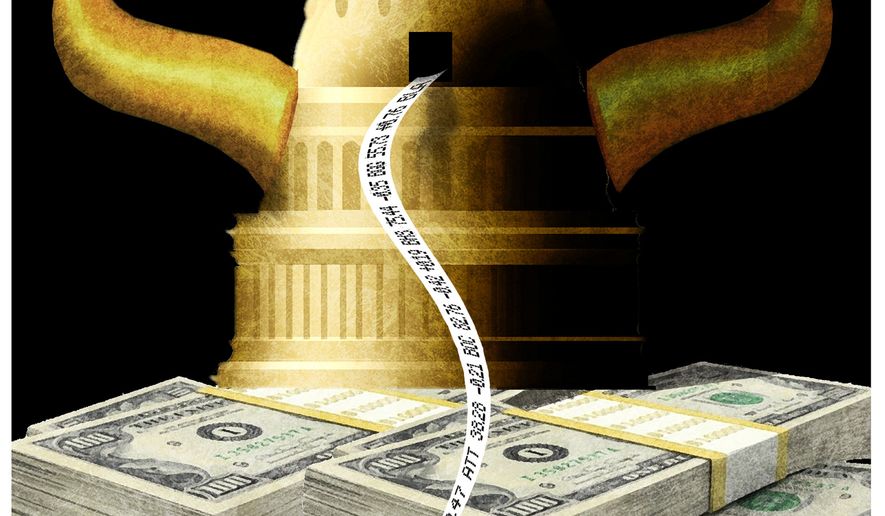OPINION:
Oh, the paradox of congressional stock trading, where our dear elected lawmakers seem to have the Midas touch, turning closed-door briefings into gold — except the gold doesn’t trickle down to John Q. Public, but lines the pockets of those with Capitol Hill access badges.
In a stirring saga fit for the annals of Wall Street folklore, our elected magicians made over $1 billion vanish from the market and — abracadabra — reappear in their portfolios. Ah, the efficiency of democracy at work.
Cue the ethical cacophony, where the ETHICS Act — named with an irony that would make Jonathan Swift’s head spin — is waiting in the wings, teased with support like a carrot dangled in front of a starry-eyed donkey.
Now enters the star-studded cast, led by none other than former House Speaker Nancy Pelosi, who, with her $100 million in trades, might as well be the Gordon Gekko of government. Then there’s the astonishing Rep. Brian Higgins, New York Democrat, who is not just doing well: He’s doing “238% returns” well.
And let’s not forget Republican Rep. Mark Green of Tennessee, who apparently has a knack for picking stocks as well as he chairs committees. He made gains of 122.2%. Other studies have found that stocks of a bunch of members of Congress have returned around 273% since April 2020.
“But wait!” you say. “Aren’t these noble souls bound by the STOCK Act?” Precisely — the very legislation that slaps the wrist with a laughable $200 fine, the equivalent of leaving a senatorial tip for a bowl of bean soup at the Senate cafeteria.
A report from Business Insider found that 49 members of Congress and 182 senior-level congressional staffers had “violated the so-called STOCK Act, which requires public disclosure by themselves and family members within 45 days of sales or purchases of individual stocks, bonds and commodity futures.”
Our hapless heroes in high offices say they’re all for banning Congress from stock trading — because, of course, nothing says commitment like unanimous lip service. Mrs. Pelosi herself has voiced support for such a ban, yet she evidently sees merit in a broader brushstroke, perhaps in the same way she sees vast potential in diversifying her portfolio.
Just last year, Lady P enjoyed a whopping 65% return on her investments, well over double the S&P 500’s overall 24% gain. Mrs. Pelosi and her husband have made millions since she took office. In December 2022, the couple sold more than $1.5 million in Alphabet stock. Then guess what happened? The Justice Department announced an antitrust lawsuit against the tech giant the very next month.
The Pelosis sold 30,000 shares of Alphabet, the parent company of Google and other companies, on Dec. 20, 21 and 28, 2022, the Daily Caller reported. They received between $1.5 million and $3 million for the total sale, according to a financial disclosure form filed on Jan. 12, 2023. DOJ announced its lawsuit against Alphabet on Jan. 23.
Between 2007 and 2020, Mrs. Pelosi and her husband saw their stock portfolio’s worth soar by as much as $30 million. Paul Pelosi‘s net worth is said to be more than $120 million, mostly because of his holdings in technology stocks.
Nancy and Paul Pelosi, he of the famed mug shot after his drunken-driving arrest, seem to have a knack for well-timed trades. The couple bought and sold millions in Nvidia stocks just before a bill passed that subsidized the U.S. semiconductor industry with $280 billion. Huh. Another coincidence.
Here’s the problem: Lawmakers are often privy to inside information that could lead to inside trading. And that’s why they shouldn’t be allowed to buy and sell stocks while they’re in office.
Seventy percent of Americans support a ban on this covert commerce — a staggering statistic that, if harnessed correctly, could fuel a movement or, at the very least, a particularly fiery round of town hall bingo.
Unusual Whales, a trading group that compiled a report of Congress members’ trading activity in 2023, says, enough.
“It’s outrageous that members of Congress are gaming the stock market while millions of Americans struggle to make ends meet. I’d call it gangster behavior, but that would imply it’s illegal and, sadly, it is not,” the group said in a statement. “The overwhelming majority of Americans want this to stop. So let’s make it stop.”
Well, duh. But of course it won’t.
• Joseph Curl covered the White House and politics for a decade for The Washington Times. He can be reached at josephcurl@gmail.com and on X @josephcurl.




Please read our comment policy before commenting.